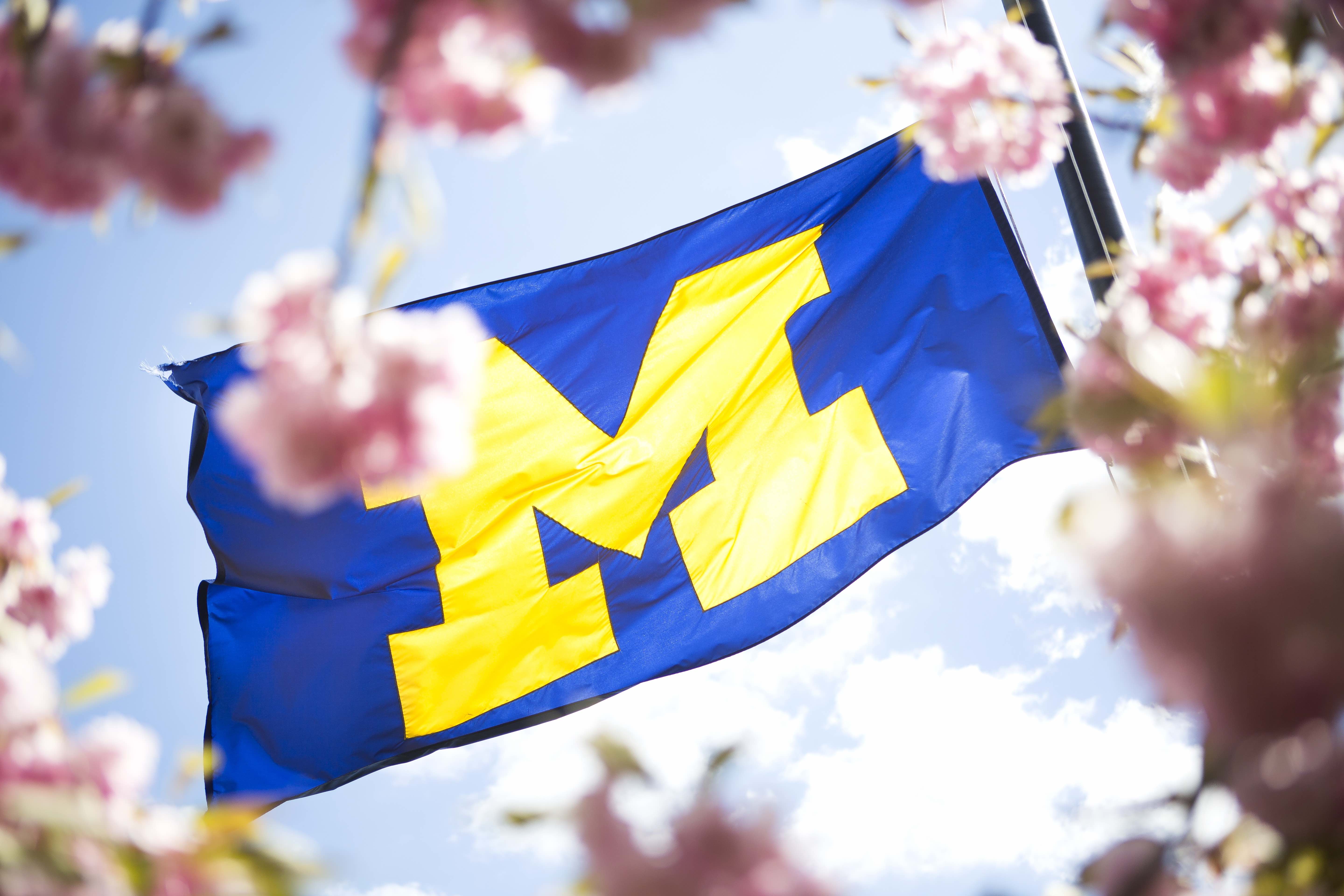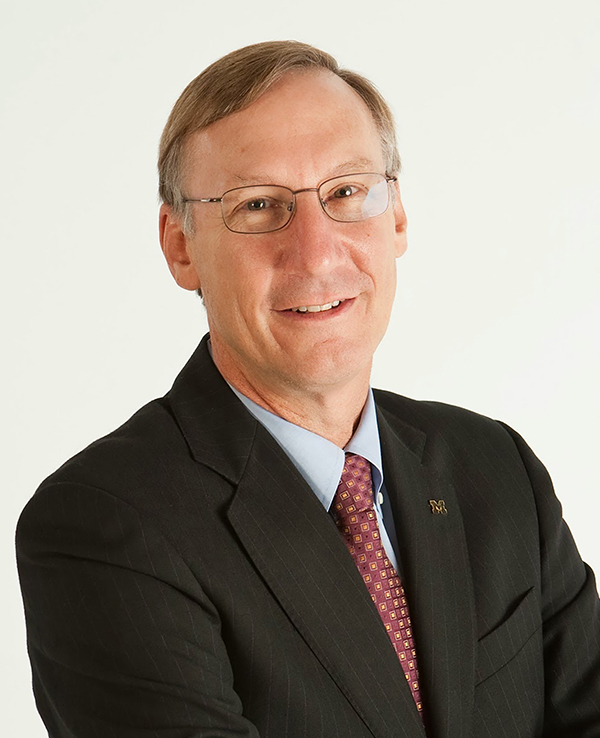The Future is Carbon Neutral
Prof. Stephen Forrest is co-chair of U-M’s Commission on Carbon Neutrality as part of U-M’s commitment to combat climate change and craft a sustainable future for all.

 Enlarge
Enlarge
President Schlissel recently announced the formation of a Commission on Carbon Neutrality, which will be co-led by Stephen Forrest, the Peter A. Franken Distinguished University Professor and the Paul G. Goebel Professor of Engineering. The commission will explore how all three U-M campuses (Ann Arbor, Flint, Dearborn) can reduce U-M’s carbon emissions to levels that are environmentally sustainable. Jennifer Haverkamp, Director the Graham Sustainability Institute and Professor from Practice of Michigan Law School, is the other co-chair.
As co-chair of the commission, Prof. Forrest will help lead a team of experts from a variety of disciplines and departments across the university, as well as regional university partners. Commission members include representatives from:
- A. Alfred Taubman College of Architecture and Urban Planning
- Academic Affairs
- Center for Sustainable Systems
- City of Ann Arbor
- College of Engineering
- College of Literature, Science, and the Arts
- Consumers Energy
- DTE Energy
- Energy Institute
- Facilities and Operations
- Gerald R. Ford School of Public Policy
- Graham Sustainability Institute
- Michigan Law
- Michigan League of Conservation Voters
- Office of Campus Sustainability
- School for Environment and Sustainability
- U-M Health System
The commission’s report, due in Fall, 2020, will include strategies for the university to achieve carbon neutrality in an economical feasible way and within a reasonable timeline. “Carbon neutrality” means having a net zero carbon footprint. To achieve net zero, carbon emissions must either be eliminated or offset by carbon removal. In addition, the commission’s primary goal is to ensure the plan is socially just and transferrable to other institutions and communities.
“You have to come up with something that’s sustainable in all dimensions,” Prof. Forrest said. “For something to really work, everybody has to agree that it’s a good solution at all levels of income and in all walks of life.”
To ensure that the university’s future strategies are as inclusive and as just as possible, the commission will create advisory panels featuring students, faculty, university staff in departments such as transportation and utilities, and an external panel with members of the community. For more information about these panels, visit Planet Blue’s website.
“The recommendations have to be economically sound,” Prof. Forrest said. “If we don’t work on this problem, that’s the most un-economically sound thing we can do.”
In addition, the plan must be scalable. This means that while each institution and community face their own challenges in achieving sustainability goals, there are many strategies and lessons from the U-M plan that can be applied to similar communities throughout the world.
“The principal outcome I would like to see is that we become a model for others,” Prof. Forrest said. “Our responsibility is to the University of Michigan, but a vast amount of the world population lives in small cities just like ours. What we do may not work for everybody, but it’ll create pathways that other people can follow, and – together – that will have a global impact.”
What we do may not work for everybody, but it'll create pathways that other people can follow, and – together – that will have a global impact.
Prof. Stephen Forrest
There are many strategies to achieve carbon neutrality, and the commission will evaluate which options make the most sense for the university. These options include upgrading old buildings to be more energy efficient, relying more on renewable energy, and implementing new policies, such as a carbon credit where the university can pay for projects that sequester carbon – like planting forests and restoring wetlands, which absorb large amounts of carbon from the atmosphere – to offset the carbon released during the construction of new buildings.
Carbon emissions are a key driver of climate change. Carbon dioxide (CO2) is a greenhouse gas, so as atmospheric CO2 concentrations increase, more infrared radiation is absorbed, which causes the global temperature to rise. While CO2 is part of nature’s natural cycle, modern society’s reliance on fossil fuels and inefficient sources of power has caused the level of atmospheric CO2 to rise drastically, resulting in a concentration higher than any in human history.

 Enlarge
Enlarge
Prof. Forrest and other researchers in electrical and computer engineering at Michigan have been working towards a sustainable future for more than a century. Alumnus Charles F. Brush (BSE 1869), inventor of modern arc lighting, received an honorary degree in 1912 for being “the earliest pioneer in the field of electric lighting.” More recently, our faculty and students have been finding ways to better incorporate sustainable energy sources into the electrical grid; improving the efficiency of solar cells; developing highly efficient lighting; advancing remote sensing technology to better understand how the earth is changing; developing ecofriendly substances to replace harmful materials used in our everyday lives; creating methods generate sustainable energy through artificial photosynthesis; finding ways to clean polluted water; building robots to help us adapt to the consequences of more severe weather events while we work to stabilize the climate, and more.
Prof. Forrest himself is a world-renowned pioneer in the field of renewable energy. He began working on solar cells in the 1980s and organic light-emitting diodes (OLEDs) – which are more power efficient than traditional light-emitting diodes (LEDs) – in the 1990s. In 1998, he was part of a team that demonstrated the first ultrahigh efficiency phosphorescent organic light-emitting diode (PHOLED) and later increased its efficiency by 50%, making it applicable for general lighting. Recently, he’s been working on turning windows into solar cells that could power entire buildings.
Climate change is overwhelming and can feel defeating, but despite the challenge, Prof. Forrest sees climate change as an opportunity for humans to do what we’ve always done: evolve. Humans created this problem, after all, so why wouldn’t we be capable of fixing it?
“So what if it’s tough?” says Forrest. “I’m an engineer. I like tough problems.”
About Stephen Forrest

 Enlarge
Enlarge
Prof. Forrest is an internationally-renowned researcher, educator, and entrepreneur, as well as one of the most prolific inventors in academia today. He is a member of the National Academy of Engineering, the National Academy of Inventors, and the National Academy of Sciences – one of the highest distinctions for a scientist or engineer in the United States. He is particularly well known for his work in the field of optoelectronics. He serves as director of the Optoelectronic Components and Materials (OCM) Laboratorywhere he and his group focus on organic solar cells and organic solid-state lighting. His investigations in these areas span decades and have resulted in five startup companies, over 300 patents, and key technologies that are pervasive in the marketplace.
More Information
Visit the Energy Institute to learn more about U-M’s current projects tackling carbon emissions
 MENU
MENU 
